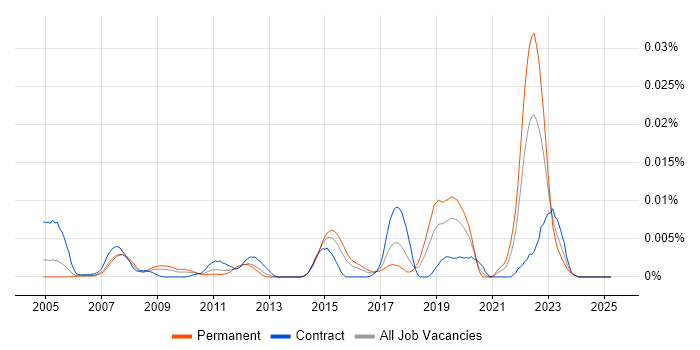MathWorks Polyspace
UK
The table below provides summary statistics for permanent job vacancies requiring Polyspace skills. It includes a benchmarking guide to the annual salaries offered in vacancies that cited Polyspace over the 6 months leading up to 10 May 2025, comparing them to the same period in the previous two years.
| 6 months to 10 May 2025 |
Same period 2024 | Same period 2023 | |
|---|---|---|---|
| Rank | - | - | 966 |
| Rank change year-on-year | - | - | +238 |
| Permanent jobs citing Polyspace | 0 | 0 | 7 |
| As % of all permanent jobs advertised in the UK | - | - | 0.007% |
| As % of the Development Applications category | - | - | 0.048% |
| Number of salaries quoted | 0 | 0 | 5 |
| 10th Percentile | - | - | £47,050 |
| 25th Percentile | - | - | £73,750 |
| Median annual salary (50th Percentile) | - | - | £77,500 |
| Median % change year-on-year | - | - | +10.72% |
| 75th Percentile | - | - | £81,250 |
| 90th Percentile | - | - | - |
| UK excluding London median annual salary | - | - | £77,500 |
| % change year-on-year | - | - | +10.72% |
All Development Application Skills
UK
Polyspace falls under the Development Applications category. For comparison with the information above, the following table provides summary statistics for all permanent job vacancies requiring development application skills.
| Permanent vacancies with a requirement for development application skills | 5,695 | 9,534 | 14,447 |
| As % of all permanent jobs advertised in the UK | 10.44% | 9.62% | 14.26% |
| Number of salaries quoted | 3,813 | 6,703 | 8,865 |
| 10th Percentile | £37,574 | £36,250 | £41,250 |
| 25th Percentile | £46,250 | £45,000 | £50,000 |
| Median annual salary (50th Percentile) | £60,000 | £60,000 | £65,000 |
| Median % change year-on-year | - | -7.69% | +4.00% |
| 75th Percentile | £75,000 | £77,500 | £82,500 |
| 90th Percentile | £96,250 | £95,000 | £100,000 |
| UK excluding London median annual salary | £57,500 | £55,000 | £57,500 |
| % change year-on-year | +4.55% | -4.35% | +4.55% |
Polyspace
Job Vacancy Trend
Job postings citing Polyspace as a proportion of all IT jobs advertised.

Polyspace
Salary Trend
3-month moving average salary quoted in jobs citing Polyspace.
